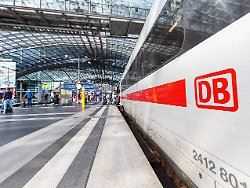Tuesday, June 8th 2021
A specific date is still pending
GDL announces strike in rail traffic
Even in the fourth round of negotiations on the collective bargaining conflict, the German Engine Drivers’ Union and Deutsche Bahn failed to reach an agreement. The fronts are hardened. Now there are said to be strikes in the resurgent rail traffic.
Rail travelers must expect significant disabilities in the summer travel season. After the failed collective bargaining negotiations with Deutsche Bahn, the union of German locomotive drivers (GDL) announced the “initiation of industrial action”. She did not give a date for a strike. It also left open which areas of the company could initially be affected. The communication made no mention of a strike vote among the members.
A new attempt to resolve the collective bargaining conflict between Deutsche Bahn and the train drivers’ union GDL failed on Monday in the fourth collective bargaining round. “We wanted to negotiate and reach an agreement, but DB refused again,” said union leader Claus Weselsky. He accused the railway of wanting to worsen the working conditions of the train crew and of lying in statements to the contrary.
The railway accused the union of “confrontation at all costs” on Monday. In the past, the train drivers’ union did not initially name any specific dates or regions for warning strikes in similar constellations. This then followed with a lead time of at least 24 hours. If there is a warning strike, it would be the first at Deutsche Bahn since December 2018, when the Railway and Transport Union (EVG) called on its members to take part in a labor dispute. The last wave of strikes by the GDL was six years ago.
Railway hit hard
Bahn Personnel Director Martin Seiler had said on Monday evening that they were ready to continue talks and asked the GDL to resume negotiations immediately. “We want to continue negotiating a balanced and solidarity-based collective bargaining package. After more than a year in the pandemic, common sense is required instead of strikes,” explained Seiler.
The labor dispute hits not only the customers, but also the financially troubled company at an inopportune moment. After the relaxation of the Corona rules, the state-owned company’s business is just picking up speed again. In regional transport you drive the full range, in long-distance transport almost 100 percent, said Seiler. “Bookings are picking up again, that’s nice.” It is all the more important that the Union of German Locomotive Drivers (GDL) make its contribution in solidarity.
A tricky collective bargaining dispute
The GDL had rejected an initial rail offer as unacceptable and then submitted changed demands itself. You should now be leaning on public sector degrees. The contracting parties in the public service agreed in autumn on wage and salary increases of 3.2 percent over a period of 28 months. Due to the slump in traffic, however, special rules apply at airports with delayed tariff increases, reduced working hours and a suspension of performance-related pay.
Deutsche Bahn has already agreed a wage increase of 1.5 percent with the larger railway and transport union for a period from the beginning of 2022 to the end of February 2023. This year there should be no wage increase. Deutsche Bahn is aiming for a comparable degree with the GDL. The earlier demand for 4.8 percent more wages was not repeated in this way. According to the railway, the overall demands of the GDL are three times what was agreed in the public service.
The railway makes billions in losses. In September she therefore put together a collective bargaining package with her largest union, the EVG. From the beginning of 2022, employees will receive 1.5 percent more money. No redundancies for operational reasons are possible until the end of 2023. In the past wage rounds, the almost 215,000 Deutsche Bahn employees were able to look forward to, in some cases, significantly higher increases in income. The GDL refused to take part in the negotiations. An arbitration in autumn failed. After the wage agreement expired at the end of February, the new round of negotiations began.
The collective bargaining round is made even more complicated by the fact that EVG and GDL both claim to negotiate with rail staff for almost all 185,000 employees in Germany. However, the railway sees itself forced to apply the uniform tariff law. According to this, a collective agreement only applies where the respective union has a majority. According to Bahn, GDL only has a majority in a small number of the Group’s individual operations. The union denies this and takes legal action against this assessment.
.
